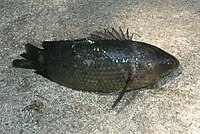Anabas testudineus
| Climbing perch | |
|---|---|

| |
| Scientific classification | |
| Kingdom: | Animalia |
| Phylum: | Chordata |
| Class: | Actinopterygii |
| Order: | Anabantiformes |
| Family: | Anabantidae |
| Genus: | Anabas |
| Species: | A. testudineus
|
| Binomial name | |
| Anabas testudineus (Bloch, 1792)
| |
| Synonyms[2] | |
| |
Anabas testudineus, the climbing perch, is a species of fish in the family Anabantidae, the climbing gouramis. It is native to Asia, where it occurs from India east to China and to the Wallace Line. It is an invasive species that can live without water for 6–10 hours.[3] It is believed that the fish may be invading new territories by slipping aboard fishing boats. It has also been established in some countries outside of its native range, in eastern Indonesia and Papua New Guinea. It is believed to be advancing toward Australia. In late 2005, the fish was discovered on Saibai Island and another small Australian island in the Torres Strait north of Queensland, about three to four miles south of Papua New Guinea.[4]
This species grows to 25 cm (9.8 in) in total length.[2]
It is likely that this is a species complex, with the name Anabas testudineus applied to what are actually several different species. With further study, populations of this fish may be divided up into separate species and given new names.[1]
As food[]
This species is important as a food fish in certain areas of South Asia and in Southeast Asia, where its ability to survive out of the water for extended periods of time, provided it is kept moist, improves its marketability.[2]
 Pla mo at a riverside market in Ratchaburi Province, Thailand |
 Anabas testudineus curry preparation |
See also[]
References[]
- ^ a b Ahmad, A.B.; Hadiaty, R.K.; de Alwis Goonatilake, S.; Fernado, M.; Kotagama, O. (2019). "Anabas testudineus". IUCN Red List of Threatened Species. 2019: e.T166543A174787197. doi:10.2305/IUCN.UK.2019-3.RLTS.T166543A174787197.en. Retrieved 20 November 2021.
- ^ a b c Froese, Rainer and Pauly, Daniel, eds. (2019). "Anabas testudineus" in FishBase. August 2019 version.
- ^ Hughes, G. M.; B. N. Singh (1970). "Respiration in an Air-Breathing Fish, the Climbing Perch Anabas Testudineus Bloch". Journal of Experimental Biology. 53: 265–280. Retrieved 17 June 2020.
- ^ Jonathan Pearlman, Aggressive 'walking' fish is heading south towards Australia, scientists warn, The Telegraph, Tuesday 02 June 2015 from telegraph.co.uk, accessed June 2, 2015.
External links[]
 Media related to Anabas testudineus at Wikimedia Commons
Media related to Anabas testudineus at Wikimedia Commons
- IUCN Red List least concern species
- Anabas
- Taxa named by Marcus Elieser Bloch
- Fish described in 1792
- Ray-finned fish stubs
